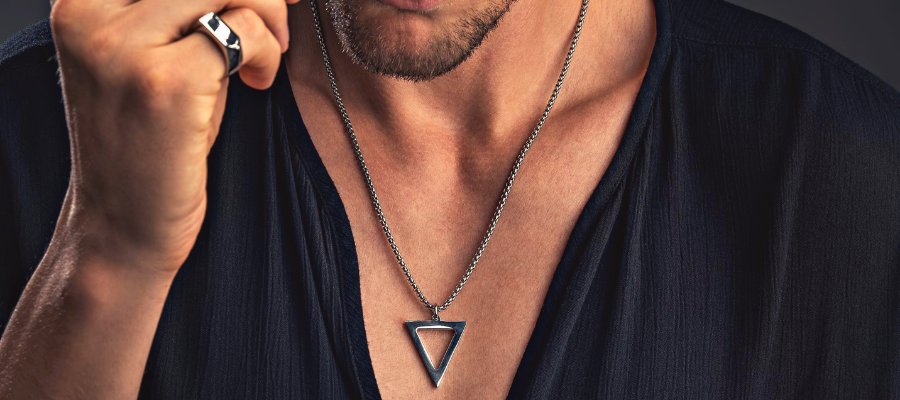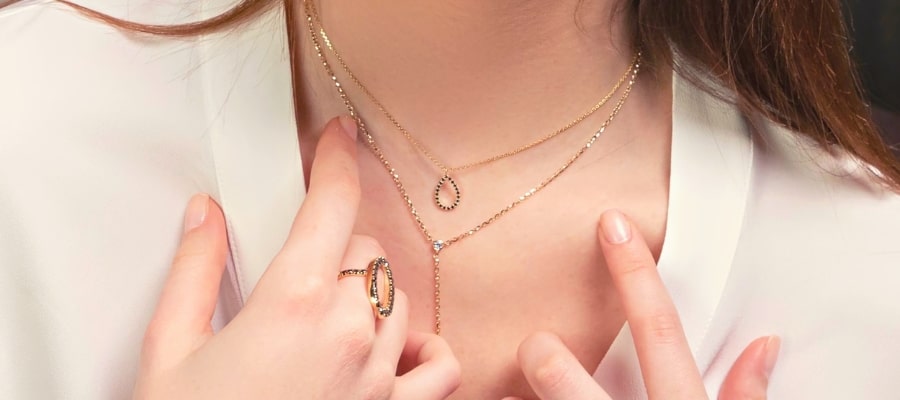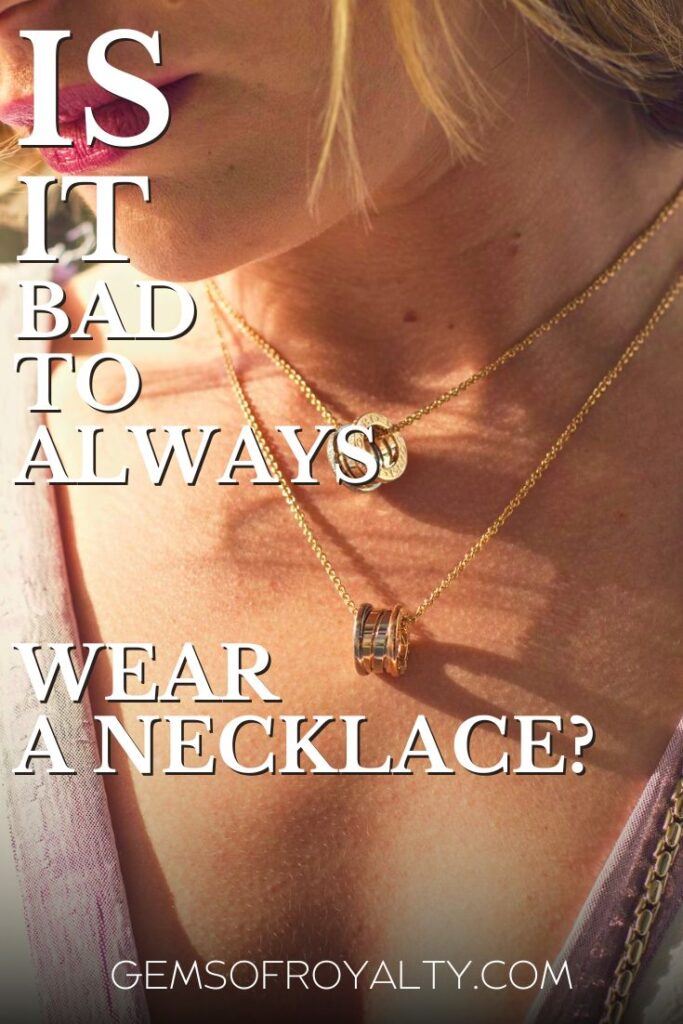You’ve purchased a new necklace that’s so beautiful and flattering you want to wear it every day. However, you might have some concerns, whether related to the potential damage to the necklace or your health. Is it bad to always wear a necklace?
It isn’t bad to always wear a necklace, as long as you keep it clean and choose jewelry that’s made out of materials that won’t cause skin issues, such as irritation. You also have to be careful that you don’t damage your jewelry, such as by leaving your necklace on when sleeping.
In this article, I’ll explore what you need to know about wearing a necklace all the time. I’ll also feature tips for when you should remove your necklace to keep it in good condition, such as when doing certain activities like swimming.
Deciding Whether To Always Wear a Necklace: Key Considerations

Although you can wear a necklace all the time, there are some important things to consider before you go ahead. These will ensure that you keep your skin healthy and the jewelry item in good condition.
Avoid Wearing Costume Jewelry All the Time
If you want to wear a necklace all the time, it’s a good choice to wear real silver or gold.
However, if you wear costume jewelry that contains coatings or necklaces with metals like nickel in them, these can be bad for your skin. The necklace will become tarnished and rub off on your skin, leaving behind black or green marks.
Avoiding nickel is especially important if you have a confirmed nickel allergy. This allergy
causes allergic contact dermatitis and shows up as the following symptoms:
- Blisters
- Dry skin patches
- Redness
- Skin color changes
- Rashes
- Bumps
- Itching
Even if you don’t have a nickel or metal allergy, since you’ll be wearing your necklace all the time, it will come into contact with water and sweat on a daily basis. Both of these will cause the jewelry metals to react with your skin.
Although costume jewelry might look good and feel comfortable, research has found that this jewelry contains carcinogens and toxins. The risk is increased if you put your jewelry in your mouth, such as when children sometimes play with their necklaces and nibble on them.
Stick to authentic jewelry materials, such as gold and silver.
Be Careful of Wearing a Necklace to the Gym
When you hit the gym to work up a sweat, it may be best to leave your jewelry at home or in the locker.
Sometimes, it’s okay to keep wearing your necklace while doing light workouts. Still, it depends on the type of necklace material you’re wearing. If your necklace is made out of the following, it won’t be ruined by skin oils and sweat:
- Gold-filled jewelry. This contains more alloy than the quantity you’ll find in gold-plated necklaces, so it’s more durable.
- Sterling silver. Although sterling silver feels light to wear, it’s strong.
- Solid gold. This metal is more expensive, but it’s strong.
By comparison, many cost-friendly necklaces are made of materials that can get damaged when exposed to your sweat. Examples include:
- Copper
- Nickel
- Brass
When it comes to your safety during a vigorous workout or when you’re using gym machines, you should be careful about the style of the necklace that you’re wearing. Small and delicate necklaces that stay close to your skin and don’t move around a lot or get in your way are ideal.
Conversely, you should avoid wearing a long necklace that will not only irritate you when you’re working up a sweat but it could get stuck on machines and break or hurt you.
Bath Soap Can Dull Real Silver and Gold Jewelry
Although it’s safer to wear real silver or gold jewelry because it won’t tarnish or fade, it’s always good to remove your jewelry to prevent it from getting damaged.
For example, you should always remove your jewelry before you take a shower because soap can damage it or leave it looking dirty.
- Real silver can become tarnished from the water that reacts with the metal. This is why your silver necklaces can start to look darker in color.
- Solid gold jewelry should also not be worn in the shower. Even though this is a strong material, it can become less shiny. This is why your gold necklace can take on a dull or lackluster appearance.
Avoid Wearing a Necklace to Bed
While you can wear a necklace to bed and, depending on its material and construction, it will be strong enough to handle friction, it can become damaged if you toss and turn a lot in your sleep.
If your necklace is very delicate, it can easily break as it can be pulled when you move around in the bed. Also, if your necklace is long or has lots of beads or charms on it, sleeping with it isn’t a good idea.
The necklace could get tangled in your hair or the sheets—both of which could require costly repairs. This can also injure you while you sleep, especially if you toss and turn a lot during the night.
Wearing a Necklace Isn’t Suitable for Some Jobs
If you’re wearing a long necklace, this can easily get caught on dangerous equipment, so you have to be careful depending on the type of activity you’re doing.
It’s also essential to bear in mind that this can put other people’s health in danger, such as if you’re a nurse. The necklace can transfer germs and bacteria to your patients.
Necklaces, and other jewelry that’s made out of metal, are potentially dangerous in certain jobs, such as if you’re an electrician. The metal conducts electricity, which can give you a shock.
Other times when you should remove necklaces at work include:
- If you work with machinery, avoid wearing long necklaces.
- If you work with chemicals, these can damage your necklace and other jewelry.
- If you work with power tools, you should avoid long necklaces as they can get stuck.
Wearing Your Necklace All the Time Prevents Its Maintenance
Something to consider when wearing a necklace all the time is that it can prevent you from properly taking care of your jewelry. You might not notice any damage or discoloration, which can lead to greater damage.
Therefore, sometimes it’s good to remove and inspect your necklace to see if it can benefit from a cleaning session or needs to be polished.
How To Clean a Necklace
While the way you clean your necklace will vary depending on the type of material it’s made out of, there are some general tips that you should follow when cleaning a necklace to keep it clean and hygienic.
Here are the steps to follow.
- Fill a small bowl with a few drops of mild dish soap and warm water.
- Place your necklace in the bowl and let it soak for about 10-15 minutes.
- Rinse your necklace with cool water.
- Place it on a clean cloth so that it can dry.
- Use a microfiber cloth to dry and polish your jewelry. This is especially good for gold and silver necklaces to make them sparkle.
Cleaning your necklace regularly isn’t just a good way to keep it looking good, but it’s also better for your skin as it will prevent germs from causing irritations or other issues such as breakouts.
Never Wear a Necklace While Swimming
Another activity you shouldn’t do when wearing a necklace is swimming, whether you’re swimming in your pool at home or in the ocean. There are many reasons for this.
- Swimming pool chlorine can discolor metals like platinum. It also destroys the polish of gemstones.
- Saltwater damages metals. It can also cause damage to the settings in jewelry. Saltwater leaves behind a residue that will tarnish your jewelry sooner.
Be Careful of Leather Necklaces
It’s becoming trendy for new and unique materials to be used to make jewelry pieces, such as necklaces, with an example being leather. Although you might think this is safer to wear if you have sensitive skin, leather can contain traces of metals, such as chromium, because metal is sometimes used in the leather-tanning process.
So, if you wear a leather necklace all the time, you might notice some skin irritation if your skin is sensitive or you’re allergic to metal. It’s, therefore, a better idea to avoid wearing this type of necklace too regularly.
Other Activities That Require Removing Your Necklace

There are other times when it’s generally not advised to wear a necklace, such as when you’re:
- Applying skin products. If you’re rubbing on moisturizer or sunscreen, you don’t want the products to make contact with your necklace and cause a build-up of dirt that makes your necklace look tarnished. You should apply your skin products and fragrances before wearing your jewelry and allow them to dry properly before you put on your necklace.
- Spending time in the sun. The sun’s UV rays can discolor and damage your necklaces and other jewelry items. You’re also more likely to sweat when staying under intense sunlight. Remember to remove your necklace and pack it safely if you’re in the sun for a long time, like when sunbathing or playing sports.
- Babysitting small children. When looking after toddlers and infants, it’s best to avoid wearing your favorite necklaces as it’s common for babies to reach for and pull them. This can break and damage the necklaces or injure the baby’s hand. If the necklace contains any small parts, these can become a choking hazard for the baby.
Understand Your Jewelry Will Get a Bit Damaged

Besides certain health and safety concerns, it’s also best not to wear a necklace too often because your jewelry will inevitably get damaged over time. No jewelry is going to last forever, especially if you wear it all the time and expose it to harmful elements.
So, before deciding to always wear a necklace, you will have to make peace with the fact that it will get a bit scuffed or scratched. No matter what type of necklace you’re wearing and what materials it’s made of, it will need to be maintained so that it looks as good as new.
Thin and delicate jewelry can become tangled when you wear them every day, especially if they’re long or if you keep putting them on and taking them off, such as when swimming. To detangle necklaces, you should try methods such as:
- Using baby powder. Place the necklace on a soft cloth and pour a bit of baby powder on it. Gently rub the necklace with the powder and cloth. This will detangle the knots in it. You will have to rinse off the powder afterward.
- Using soapy water. Dip the necklace in a bowl of soapy water and run your fingers through the knots. The soap will help to lubricate the knots in the necklace. Try not to pull the necklace hard, as this could damage the fine jewelry.
- Bringing your necklace to a jeweler. If all else fails, you should bring your necklace to a jeweler who will be able to detangle it with the use of specialized tools.
Necklace Materials You Can Wear All the Time

If you’d like to wear a necklace that won’t react with chemicals in pool water or get damaged by UV rays, there are durable materials to choose from. They include the following:
- Plastic. A plastic necklace will be strong and durable. However, acrylic can be damaged by the use of essential oils that will break them down, so that’s something to bear in mind before wearing certain plastic necklaces.
- Silicone. A silicone necklace is easy to care for and durable. It takes a lot for a silicone necklace to break. However, you should avoid silicone necklaces with beads or other elements, as these can be pulled off or broken from the chain.
Final Thoughts
If you want to wear your favorite necklace every day, this shouldn’t be a problem for your skin as long as the necklace is made out of metals like pure gold and silver. Other materials are also okay as long as they’re durable and you don’t have any allergies to them.
However, there are times when you should avoid wearing a necklace for your own safety and for the longevity of your jewelry. These times include the following:
- Sleeping
- Showering
- Swimming
- Spending time in the sun
- Working with machinery or chemicals


